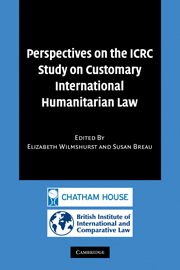Book contents
- Frontmatter
- Contents
- Preface
- List of contributors
- Table of cases
- Table of treaties and other instruments
- Abbreviations
- Part 1 Setting the scene: Theoretical perspectives on international law in the ICRC Study
- Part 2 The status of conflict and combatants: The ICRC Study
- Part 3 Commentary on selected Rules from the ICRC Study
- 6 The law of targeting
- 7 Protected persons and objects
- 8 Natural environment
- 9 Specific methods of warfare
- 10 Weapons, means and methods of warfare
- 11 Fundamental guarantees
- 12 Status and treatment of prisoners of war and other persons deprived of their liberty
- 13 Displacement and displaced persons
- 14 Implementation and compliance
- 15 War crimes
- Part 4 Conclusions
- Index
12 - Status and treatment of prisoners of war and other persons deprived of their liberty
Published online by Cambridge University Press: 09 July 2009
- Frontmatter
- Contents
- Preface
- List of contributors
- Table of cases
- Table of treaties and other instruments
- Abbreviations
- Part 1 Setting the scene: Theoretical perspectives on international law in the ICRC Study
- Part 2 The status of conflict and combatants: The ICRC Study
- Part 3 Commentary on selected Rules from the ICRC Study
- 6 The law of targeting
- 7 Protected persons and objects
- 8 Natural environment
- 9 Specific methods of warfare
- 10 Weapons, means and methods of warfare
- 11 Fundamental guarantees
- 12 Status and treatment of prisoners of war and other persons deprived of their liberty
- 13 Displacement and displaced persons
- 14 Implementation and compliance
- 15 War crimes
- Part 4 Conclusions
- Index
Summary
Introduction
One may wonder how the authors of the Study would have approached the topic of detention during armed conflict if they were to analyse it today, nearly three years since the research for the Study was completed. By the end of December 2002, the conflict in Afghanistan was fully underway, where the massive arrests of the members of the Taliban and Al-Qaeda supporters were made. They were then transferred to the military detention facility in Guantánamo Bay. The invasion of Iraq was looming on the horizon. We were yet to hear of the abuse of prisoners in Abu Ghraib prison and other detention centres in Iraq, and the numerous incidents involving torture and inhumane treatment of both combatants and non-combatants by the forces involved in these conflicts.
The mistreatment of individuals deprived of their liberty has occurred probably in every war that has ever been fought, yet the recent practice is particularly shocking as it appears to be directed at diminishing or depriving an individual of dignity and humanity. These practices, which in many cases have been supported by State policy, strike at the very heart of international humanitarian law, the spirit of humanitarian values and respect for a human being during war, the most cruel of all times. The law as we know it has not changed but the fighters and the goals of the fight may have done so.
- Type
- Chapter
- Information
- Publisher: Cambridge University PressPrint publication year: 2007



